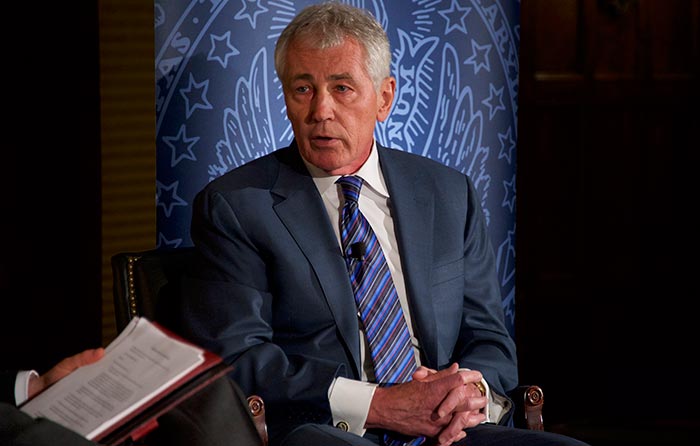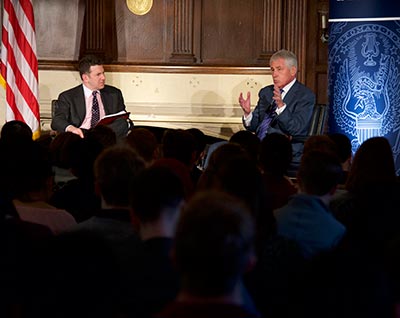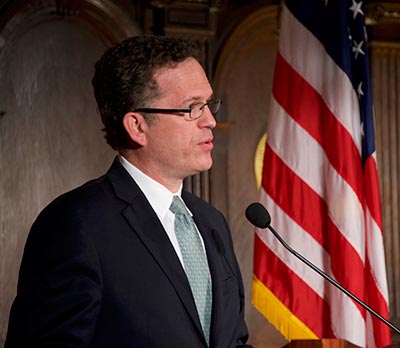Title: Former U.S. Secretary Hagel Calls Cyber Warfare Greatest Security Threat
Former U.S. Defense Secretary Chuck Hagel says global community views cyber warfare as greatest threat to security during conversation at Georgetown.

Former U.S. Defense Secretary Chuck Hagel said the global community is most threatened by the “quiet” nature of cyber warfare – making it difficult to trace or detect warning signs – during a conversation yesterday at Georgetown.
“Cyber warfare represents the most ingenious, insidious and growing threat to our security,” said Hagel during his conversation on global security with School of Foreign Service professor Daniel Byman.
Hagel also called for new cyber legislation that enables government assets – including the NSA and U.S. Cyber Command – to do more to protect against cyber warfare within the bounds of privacy and the law.
Fraying Partnerships

School of Foreign Service professor and security expert Daniel Byman talks to former U.S. Secretary of Defense Chuck Hagel about global security during a March 21 conversation.
Hagel, who is now a Distinguished Executive-in-Residence at Georgetown, served as the 24th U.S. Secretary of Defense, 2013-2015, and spent two terms in the U.S. Senate representing Nebraska, 1997-2009.
He added that the deterioration of decades-old alliances and partnerships, including NATO and the European Union, poses another significant threat to the global community.
“We’re seeing an EU fray at the edges,” said Hagel. “A referendum is coming up in a few months on whether the British should exit from the European Union. That’s dramatic.”
A Shifting World Order
Hagel said most Americans born during or after World War II believe in America’s foreign policy dominance.
“We’ve told people what to do, how to do it. If you didn’t comply with our standard at our time, you weren’t measuring up,” he explained.
Now, the world order is shifting, he added.
“We are living at a time of the greatest diffusion of economic power the world has ever seen. With that has come [diffusion of] political power, decision-making power – people wanting to make their own choices,” Hagel said.
Hagel believes the United States should focus on managing relationships with allies and growing powers and that it should avoid political absolutism and rushed interventions.
“In a world of 7 billion, soon to be 9 billion people, we have no alternative. If we don’t get along and figure this out, we will destroy the world and each other,” he said.
The Global Future of Security

Thomas Banchoff
The event with Hagel and Byman continues a semester-long conversation about “The Global Future of Security,” convened by the university’s Global Futures Initiative.
Thomas Banchoff, vice president for global engagement, said it was important for Georgetown to explore conversations about the future of global security because of “our strengths in security studies in the SFS and our other security-related programs across the university” during his opening remarks.
“The Global Futures Initiative is a universitywide effort to highlight and build on Georgetown’s strengths around four global issues across four semesters through events with world leaders – like this one – and support for research and teaching,” he added.
Zainab Hawa Bangura, the U.N. special representative on sexual violence in conflict, began the series with remarks on human security and violent extremism.Ertharin Cousin, the executive director of the U.N. World Food Programme, will talk about food security on April 12.
The Global Futures Initiative addressed global governance and development in past semesters and will focus on the environment during fall 2016.